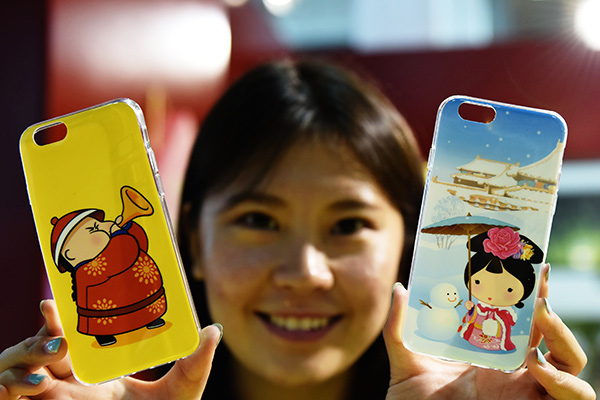
A Palace Museum employee shows mobile phone cases with cartoon images based on characters from the Qing Dynasty (1644-1911) at an exhibition in Hangzhou in October.[Photo by Long Wei/China Daily]
The State Council is urging museums nationwide to develop more original products and business ideas to promote their collections.
“Pilot programs will be introduced to State-owned museums, art galleries and libraries to achieve this goal through cooperation with and authorization for different parties,” said a statement issued on April 27 after a State Council executive meeting presided over by Premier Li Keqiang.
It was decided at the meeting that more expertise should be targeted to promoting and marketing the country’s museums, along with development of more creative souvenirs and increased efforts to attract tourists.
“Their brand establishment as well as protection and trade of intellectual property will be enhanced,” the statement said.
The museums are also encouraged to cooperate with private enterprises to develop souvenirs and other products, and revenue that is generated should be used to promote services or better preserve collections.
Pan Shouyong, a museology professor at Minzu University of China, said: “It is important to supervise how they distribute the income. The money can be used for protection of cultural relics or to promote services, but it can never be used for employee bonuses.”
Pan said time is needed to establish a new management system for China’s museums, and such a system must balance the museums’ business operations and public service function.
Many Western museums have developed a myriad of creative souvenirs via selling franchises and even charge for use of their space for such purposes as shooting of films.
“Their experience tells us that different kinds of cultural events can be held in museums,” Pan said, including weddings. “But a museum has to remember that its priority is public service, no matter what commercial activity is undertaken.”
Some of the country’s museums have already successfully enhanced business operations.
For instance, Beijing’s Palace Museum, also known as the Forbidden City, announced last month that its sales of souvenirs last year surpassed 1 billion yuan ($154 million). According to Shan Jixiang, the museum director, the institution has developed 6,754 cultural souvenir products.
However, as more museums ramp up their business operations, some problems have arisen. On April 24, Nanjing Municipal Museum in the capital of Jiangsu province cooperated with a real estate developer to hold a promotional event at the museum. The event stirred controversy, and the museum director was suspended during further investigation.
